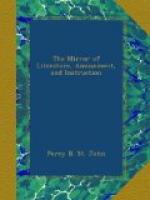* * * * *
BENEDICTION ON CHILDREN.
IMPROMPTU.
By Thomas Campbell, Esq.
Imps, that hold your daily revels
Round the windows of my bower
Would that Hell’s ten thousand devils
Had you in their clutch this
hour!
Screaming, yelling, little nasties,
Would that Ogres down their
maw
Had you cramm’d in Christmas pasties,
That would make ye hold your
jaw.
Saucy imps, stew’d down to jelly,
Ye would make a sauce most
rare;
Or with pudding in each belly,
Rival roasted pig or hare.
Sweeter than the fish of these is,
Would be yours, young human
bores;
All with apples at your noses,
Would I saw you dish’d
by scores!
Herod slaughter’d harmless sucklings,
Not with tongues like yours
to vex;
Were he here, ye Devil’s ducklings,
I would bid him wring your
necks.
Metropolitan.
* * * * *
DRAMATIC CHARACTER OF THE CATHOLIC RELIGION.
The religion of the south of Europe is still essentially dramatic; and it may be questioned how far this adaptation to the genius of the people has tended to perpetuate the influence, not only of the Roman Catholic, but also of the Greek church. Even in the pulpit, not merely does the earnest preacher, by vehement gesticulation, by the utmost variety of pause and intonation, act, as far as possible, the scenes which he describes; but the crucifix, if the expression may be permitted, plays the principal part; the Saviour is held forth to the multitude in the living and visible emblem of his sufferings. The ceremonies of the Holy Week in Rome are a most solemn, and to most minds, affecting religious drama. The oratorios, as with us, are in general on scriptural subjects; and operas on themes of equal sanctity are listened to without the least feeling of profanation. Nor are the more audacious exhibitions of the dark ages by any means exploded. Every traveller on the continent who has much curiosity, must have witnessed, whether with devout indignation or mere astonishment, the strange manner in which scriptural subjects are still represented by marionnettes, by tableax parlans, or even performed by regular actors. In the unphilosophized parts of modern Europe, these scenes are witnessed by the populace, not merely with respect, but with profound interest; and if they tend to perpetuate superstition, must be acknowledged likewise to keep alive religious sentiment. But if this be the case in the nineteenth century, how powerfully must such exhibitions have operated on the general mind in the dark ages! The alternative lay between total ignorance and this mode of communicating the truth. For the general mass of the clergy were




